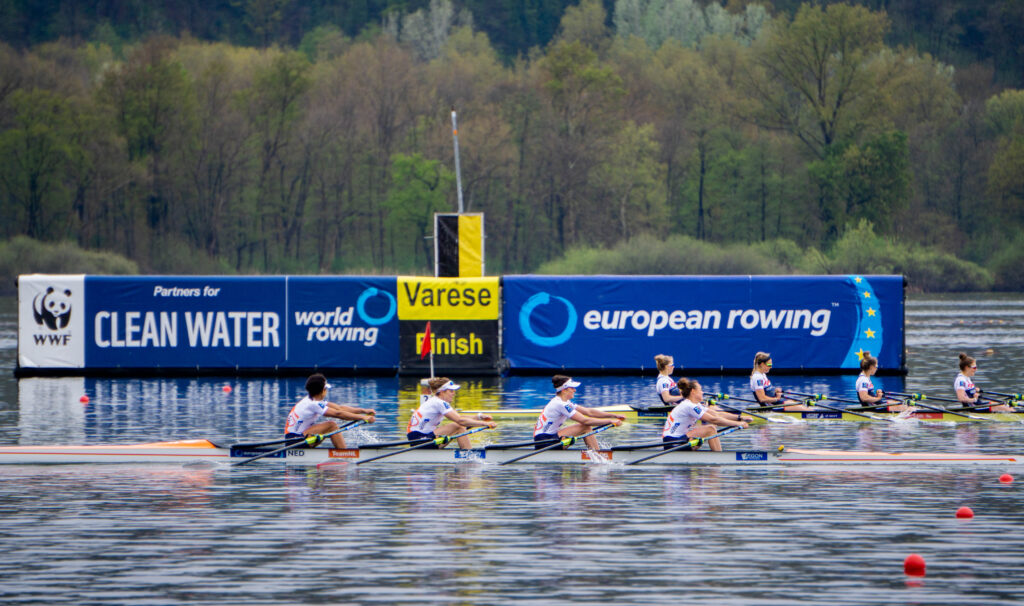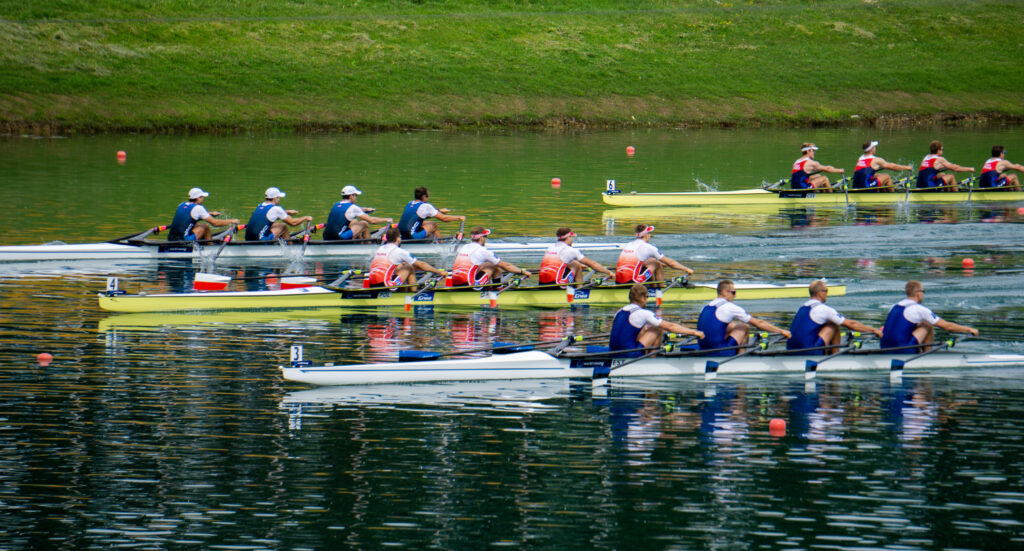
11 Apr 2022
From Tokyo 2020, looking forward: the quadruple sculls
The 2022 World Rowing season is bearing down on us, and as we move towards the first races of the international season we are reviewing a selection of our Olympic and Paralympic boat classes. The end of an Olympic and Paralympic cycle always means changes are coming – coaches change the nations they are working with, some athletes retire, some athletes stick around, but focus more on their family life or academic life.
Some call the Quadruple sculls, the thinking rower’s boat. There’s four people sitting on a skinny plank and eight oars. That’s a lot to coordinate both in balance and in timing. This is the quadruple sculls.
As we move towards the 2022 World Rowing season we highlight the men’s and women’s quad with all that went on and all that might happen.
What went on in 2021?

European Rowing Championships
In what was the first regatta of the 2021 season, it could be anyone’s game. While the 2020 European Rowing Championships had been contested in October 2020 in Poznan, many nations had decided not to take part due the the global pandemic. With more crews and more nations in the fight for the title of European Champions, athletes were ready to show what training they had put in during lockdowns.
The season got going in April, and the Netherlands did not miss a beat as their women’s quad became European Champions. But it was not without a big fight with Great Britain, who came in second. Germany finished in third. For the men, home crowd favourites Italy led from start to finish, but they had to hold off the 2019 World Champions from the Netherlands. Estonia flew through to a bronze medal with an epic final push.
World Cup Series
The three regatta series played out over the space of a month going from Croatia to Switzerland to Italy. For the men it was a mixed bag on the podium which seemed to be determined by who was able to be at the regatta, and left a lot of people wondering how this boat class would play out in Tokyo. Some crews were still aiming for Olympic qualification, while others were deep into their Olympic preparation. Estonia, featuring the great Tonu Endreksen, won the first regatta in an incredibly tight finish that had the top four boats within a second of each other. The Dutch took out regatta number two and Italy finished in a scorching 5:38 to win World Cup III.

The women’s field was rather light through the series and saw Germany winning two of the three regattas. In World Cup II the German’s ended up second behind China who competed in just one of the series. This would have been the Chinese’s crews first international regatta since the start of the global pandemic, and their only one before the Olympic Games.
The Olympic Games
With the heats completed, the Netherlands, Australia, Poland, Italy, would advance directly to the A-Final, with the rest to go through the repechage. Great Britain and Estonia were the ones who managed to clinch the remaining spots. The men’s final was full of drama when the Dutch caught a small crab near the start, and later when the Italians caught a boat-stopper coming into the middle of the race. The order changed several times through the race with the reigning World Champions, the Netherlands prevailing at the line and setting a new World Best and Olympic Best Time of 5:32.03. Great Britain’s silver was the first ever Olympic medal for them in this boat class.
Results: NED, GBR, AUS, POL, ITA, EST
Germany, the Netherlands, China and Poland managed to lead in the Heats to move directly into the A-Final. Through the repechage, Australia (who had only qualified weeks before) and Italy completed the lineup in the race for medals. Everything was going China’s way as they came into the Olympic final, and they didn’t miss a beat. Coming off the startline and in the lead, the Chinese got a full boat length lead over 2016 Olympic Champions Germany. But similar to the men’s final, a crab in the German boat saw them slow down and be overtaken within the last 150m. Poland had the best finish to come through to silver, and the Australians just ahead of Italy crossed the line in for the bronze. China’s race gave them a new World Best and Olympic Best Time of 6:05.13.
Results: CHN, POL, AUS, ITA, GER, NED
Now, that’s noteworthy
- The Top 10 women for 2021 had all four members of the Chinese quad – Xiaotong Cui, Yang Lyu, Yunxia Chen and Ling Zhang. This is the first time China has featured in the top 10.
- The Top 10 men for 2021 had the Dutch quad in the top four spots with the more senior Dirk Uittenbogaard in the top spot. Uittenbogaard has been rowing internationally for 14 years. Coming next was Abe Wiersma, Tone Wieten and Koen Metsmakers.
- The 42-year-old Estonian, Tonu Endreksen raced in 2021 at his fifth Olympics. He’d already medalled in the quad in 2016.
- The newly-crowned Thomas Keller Medal award winner, Olaf Tufte finished in the B-final in Tokyo. He achieved this at the age of 45 with members in his boat half his age. “I have two families, I have the Tufte family, but my biggest family is the rowing family. And as I say ‘If you pull on an oar you’re a rower and you’re part of my family’. Rowing is the reason I became the person I am.” – Olaf Tufte
- The silver medal for Great Britain’s men was their best result in rowing with the nation only winning one other medal – a bronze.
- From the Italian quad, Stefania Gobbi went to the Olympics and then onto the World Rowing Coastal Championships where she won the women’s single.
Onto greener pastures – or blue-er waters?
- Olaf Tufte, NOR. After nearly three decades in the sport the Norwegian is hanging up his oars. But expect to see him at some sporting event in the future, Olaf doesn’t slow down.
- Meghan O’Leary, USA. An illness and then a bike accident didn’t stop O’Leary getting to her second Olympic Games. But she’s now called it quits.
- Jack Beaumont, GBR. The Brit used Tokyo 2020 as his swansong.
- Carlotta Nwajide, GER. Not really a good bye, but more of a ‘see you soon’. Nwajide is taking a year off. As is Olivia Loe, NZL.
- Olivia van Rooijen, NED. The Dutch sculler is retiring.
- Eve MacFarlane, NZL. The now retired New Zealander has talked openly about depression and has now co-authored a book about those struggles. She is also using her time to pursue another passion of hers – art.
Crystal ball gazing
This is a boat class that will definitely see some rebuilding of line ups as gaps from retirements are filled and some rowers move into other boat classes. It is very likely China will come back strong for the women. This has been their most successful Olympic boat this cycle, and they will continue to make it their priority. Germany also has a strong record in the women’s quad and their new team at Tokyo must have more good years left in them.
The Dutch men are likely to be going through a rebuilding phase. With a new coach in 2022 they may be following a new training model. It’s likely Poland will be strong as they emphasise this boat class as one of their favourites. And there’s also the Italians who may not regularly win gold, but they are so, so often on the medals podium.
On the 2022 Calendar:
2022 World Rowing Cup I – Belgrade, Serbia, 27-29 May
2022 World Rowing Cup II – Poznan, Poland, 17-19 June
2022 World Rowing Cup III – Lucerne, Switzerland, 8-10 July
2022 European Rowing Championships – Munich, Germany, 11-14 August
2022 World Rowing Championships – Racice, Czech Republic, 18-25 September

